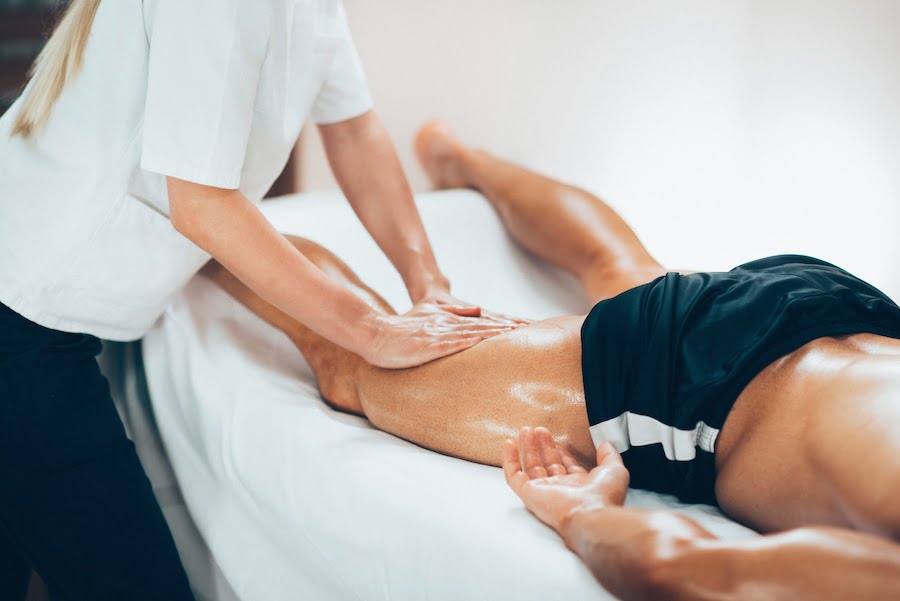In the high-stakes world of sports, where every second counts and every move matters, athletes constantly seek that extra edge to outperform the competition. This relentless pursuit of excellence brings us to the doorstep of a game-changing ally – massage therapy.
Far more than a mere tool for relaxation, massage therapy emerges as a critical element in an athlete’s arsenal, offering enhanced performance and a faster path to recovery. By delving into the science and art of massage therapy, we unveil how this ancient practice is revolutionizing modern athletic performance, turning good athletes into great ones.
The Role of Massage Therapy in Athletic Performance
The benefits of massage therapy for athletes are multifaceted. Firstly, it plays a key role in warming up muscles, making them more pliable and ready for intense activity. This boosts performance and minimizes the risk of strains and sprains. Moreover, massage therapy can increase blood flow to muscles, enhancing oxygen and nutrient delivery, vital for peak athletic performance.
Here’s a deeper dive into how massage therapy can elevate athletic performance:
Warming Up Muscles: Massage therapy is instrumental in preparing the muscles for intense physical activity. It increases the temperature of the muscles, making them more pliable and less prone to injuries like strains and sprains.
Enhanced Blood Flow and Oxygenation: Massage therapy ensures a better flow of oxygen and nutrients to the muscles by improving circulation. This is essential for muscle endurance and strength, particularly during prolonged or high-intensity sports.
Flexibility and Range of Motion: Regular massage therapy can increase flexibility and range of motion. This is particularly beneficial in sports that require a high degree of agility and flexibility, like gymnastics, swimming, and track and field events.
Reduction of Muscle Tension and Stiffness: Athletes often experience muscle tension and stiffness due to repetitive and rigorous training. Massage therapy helps in relieving this tension, enabling muscles to function more effectively.
Enhanced Neuromuscular Efficiency: Massage can stimulate the neuromuscular pathways, enhancing muscle coordination and precision. This is crucial for sports that require fine motor skills and coordinated movements.
Decrease in Muscle Soreness and Fatigue: Post-exercise soreness and fatigue can significantly hinder an athlete’s training and performance. Massage therapy helps reduce the onset of muscle soreness and accelerates recovery, allowing athletes to train more effectively.
Psychological Benefits: Beyond physical benefits, massage therapy significantly impacts an athlete’s mental health. It can help reduce stress and anxiety, improving concentration and focus during competitions.
Customized Techniques for Different Sports: A skilled massage therapist can tailor massage techniques to suit the specific needs of different sports, addressing the unique stresses and injury risks associated with each.
Preventive Care: Regular massage therapy can serve as preventive care, reducing the likelihood of future injuries and ensuring athletes can maintain a consistent training regimen.
Injury Prevention and Management
One of the key benefits of regular massage therapy for athletes is its ability to prevent injuries. Maintaining muscle flexibility and removing tension significantly reduces the likelihood of injuries.
For those who are already dealing with injuries, massage therapy therapy for athletes can be an effective component of the rehabilitation process. It helps reduce swelling, improve flexibility, and facilitate healing in injured tissues.
Regular massage therapy is a fundamental strategy for preventing and managing sports-related injuries. Its benefits are multi-dimensional:
Enhancing Muscle Flexibility and Strength
- Massage therapy works by stretching and elongating muscle fibers, which enhances their flexibility and reduces the risk of tears and strains.
- Regular sessions help maintain a healthy muscle tone, which is crucial for athletes to withstand the rigors of their sport.
Reducing Muscle Tension and Overuse Injuries
- Massage therapy helps prevent overuse injuries, common in repetitive sports, by relieving muscle tension.
- It assists in balancing muscle groups, ensuring that no single group is overstrained.
Improving Range of Motion
- Athletes often experience limited range of motion due to tight muscles and joints.
- Massage therapy can help increase joint flexibility and decrease stiffness, enhancing overall mobility.
Boosting Circulation and Reducing Swelling
- Enhanced blood flow accelerates the removal of waste products and brings nutrients to tired and damaged tissues, promoting faster recovery.
- This improved circulation can significantly reduce swelling and inflammation in injured areas.
Facilitating Faster Healing of Injured Tissues
- By promoting a more efficient nutrient and oxygen supply, massage therapy aids in the quicker healing of injuries.
- It also stimulates the lymphatic system, crucial for immune response and tissue repair.
Preventing Scar Tissue Formation:
- Massage therapy can help break down and prevent scar tissue formation post-injury.
- This is important for maintaining flexibility and preventing re-injuries in the same area.
Concluding Thoughts
Ready to prepare for your first massage session?
Now is the time to integrate massage therapy into an athlete’s regimen transcends traditional training boundaries, offering a holistic approach to sports performance and wellness. It’s not just about healing or preparing the body for athletic feats; it’s about embracing a comprehensive wellness philosophy that prioritizes the athlete’s overall physical and mental well-being.
This approach ensures that athletes are not only prepared for the challenges of their sports but are also equipped with the tools to enjoy long, healthy, and successful careers. By valuing and incorporating massage therapy, athletes step into a realm where peak performance is harmoniously balanced with lasting health and well-being, setting a new standard in sports.
Ready to experience the massage in Flower Mound, Dallas?

